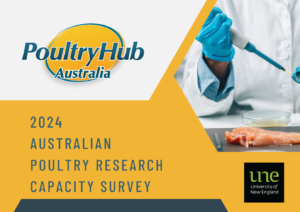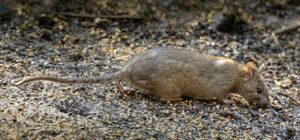Dr Amy Moss from the School of Environmental and Rural Sciences has been awarded the UNE 3Rs award for 2023 for an animal trial investigating effective enrichment in cage layer research facilities.
The annual 3Rs award forms part of UNE’s commitment to the ethical principles of the Australian Code of Practice for Care and Use of Animals for Scientific Purposes, and is designed to reward and promote the implementation, discovery or development of methodologies and/or technologies that enhance 3Rs principles.
- Replacement of animals with alternative methods.
- Reduction of the number of animals used.
- Refinement of techniques to minimise the potential impact on animals.
In order to be eligible for the award, the project must show results that either replace, reduce or refine the use of sentient animals in research or teaching. Furthermore, projects are judged against the following criteria:
- Demonstrates great commitment to 3Rs principles
- Demonstrates innovative implementation of 3Rs principles
- Will help to promote awareness of the 3Rs principles at UNE
- Advancement of an area of research
- Development of a novel procedure that replaces, reduces or refines the use of animals
- Improvement or formal validation of an existing non-animal procedure
- Replacing the use of sentient animal species with non-sentient species
- Dissemination of the 3Rs implications to scientific colleagues
- Evidence of recent peer-reviewed papers, either, published, submitted or in preparation.
- A clear indication of the extent to which the work has already replaced animal-based procedures or may be possible in the future.
Dr Moss identified that there are currently no guidelines for housing or recommendations for practical environmental enrichments for chickens used for research and teaching purposes. Whilst more traditionally used enrichment, such as pecking chains, have shown to have no impact on hen welfare. The trial aimed to identify the optimal enrichment programs to improve the welfare of caged hens used for teaching and research purposes.
The trial was conducted at UNE’s Laureldale Laying Research Facility where 168 Hy-line Brown laying hens were allocated to 6 treatments with 14 replicate cages of 2 birds per cage per treatment. The treatments consisted of:
- No enrichment control
- Perch
- Scratch pad
- Hanging CD
- Complex environment (all three enrichment forms)
- Novelty (each enrichment treatment given for 2 weeks at a time).
The trial results found that hens housed in cages with all three enrichment forms (treatment 5) had similar egg weight, egg production and egg mass, but a higher feed efficiency (P < 0.001), and a lower body weight, closer to the Hy-Line Brown standards (P = 0.008) than all other treatments. The trial demonstrated that providing all three enrichment forms is the optimal enrichment to improve the welfare of caged hens used for teaching and research purposes at UNE.
The trial was funded by UNE’s DVCR and was a collaborative effort between the DVCR, Animal Ethics Committee, University of Melbourne (Dr Peta Taylor) and UNE researchers.“. When discussing the project Dr Moss was enthused in being able to share the results of the trial more widely. “My team and I are grateful to The University of New England DVCR for providing the funding which allowed us to optimise the enrichment provided for our trial hens, giving the best outcomes for our research animals and our research trials. This is very important to us professionally and personally as we want the best outcomes for poultry and the industry. We plan to publish the results of the study and will then share the outcome with our colleagues at other universities so that they may also improve the welfare of their caged hens.”
For more information on the 3Rs award click the link. When published, the paper will be announced in a future eCHOOK edition.




